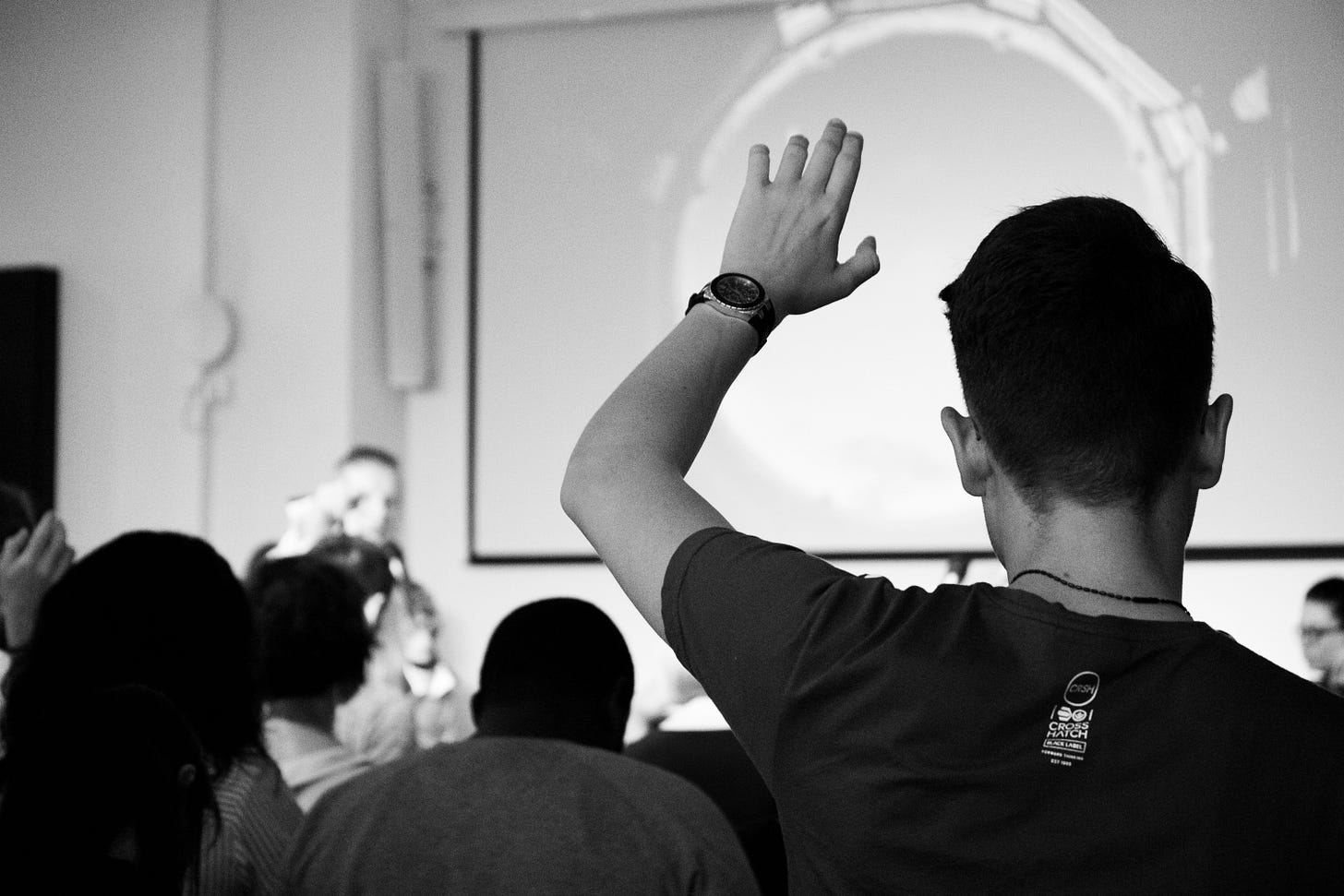This High School Program That Might Stop America From Getting Stupider
Olivia Gross has an idea for Making Education Great Again (Yes, MEGA. You're welcome)
I populate my life with smart people because it’s one way to reduce my own stupidity.
Two of those people—Derrell Bradford and Marc Porter Magee—invited me to 50CAN’s annual gathering. The best part? Three deep thinkers doing TED-style talks. The first was Olivia Gross. Let me tell you why she matters.
I’ve been telling you that bad thinking is a public health problem, not a moral failing. Stupidity is curable. Intelligence is something you practice, not something you own. Olivia Gross proves it.
She started a law review in high school. Then she turned it into a national program teaching teenagers how to disagree without becoming enemies—through constitutional law. Her origin story shaped everything. Granddaughter and great-granddaughter of Holocaust survivors, raised Jewish, she learned early: when speech is restricted, culture dies. Talmudic study reinforced it—you don’t understand an idea until you’ve wrestled with the arguments against it.
That sensibility led her to Supreme Court opinions. Then to a bigger idea: high school students could read primary texts, argue with each other, and publish their work. It started as Avenues Law Review in New York. Now it’s the High School Law Review, operating in more than a dozen states.
The model is deceptively simple: argument as craft, publication as responsibility, disagreement as muscle. Students read Supreme Court cases. They debate. They write. They sign their names to ideas they’ll defend publicly.
Here’s the brilliant part: she refuses to separate thinking into silos. Oratory feeds writing. Writing feeds oratory. Expression and accountability live together. This isn’t just civics—though it is civics. It’s cognitive training. It builds attention span, calibrates confidence, creates the habit of updating beliefs when better arguments show up.
Olivia calls it “curiosity culture.” Damn. I wish I’d thought of that.
College campuses reach for institutional intervention when someone says something upsetting. Olivia gets the vulnerability underneath that impulse. But she’s blunt about the cost: If students never practice handling discomfort—being wrong, hearing what they dislike—the intellect atrophies.
The goal isn’t turning classrooms into combat sports. It’s building trust strong enough that disagreement feels like collaboration, not attack. One of her teachers modeled it perfectly: sure of himself and unsure of himself at the same time, pushing students toward the hard edge of argument while holding the room together. That balance is the whole game.
We say we want critical thinkers. Then we design environments that punish risk, reward conformity, and keep consequential work—publishing, being read, revising in public—off to the side as enrichment. Olivia flips that.
Her students debate the First Amendment, write about equal protection, and publish on a platform where a kid in Florida reads a kid in North Dakota. The audience isn’t the teacher’s inbox. It’s a real public. That changes everything: how carefully students read, how honestly they argue, how seriously they revise. Teenagers rise to the stakes we set.
The story we tell about America’s learning slump usually collapses into two lazy moves: blame students for being dumb, or romanticize the past and scold the present. Both miss the point. The deeper problem is institutional. Schools and universities—targets for lawsuits, grievance pests, public oversight—become cautious where they could be curious, reactive where they could be rigorous.
The result isn’t a generation lacking capacity. It’s a culture depriving capacity of oxygen. That’s an existential failure of the public mind. You don’t fix it with slogans. You fix it with practices that change behavior at scale.
Which is exactly what Olivia’s model offers. Give students primary texts so arguments center on shared evidence, not personal vanities. Make disagreement a structured practice, not a social punishment engine. Tie speech to authorship so words have weight. Build recognition ladders—local journals, district journals, state journals, national journal—so reasoning gets rewarded like robotics or calculus. Keep material current. Her team updates curriculum with each Supreme Court docket. Students learn: this isn’t a museum, it’s your country.
Classrooms need guardrails, but consistency matters more than theatrics. If standards apply in one case and vanish in the next, students learn power governs discourse, not principle. Publishing empowers when it’s intentional. It corrodes when recordings replace trust.
This isn’t about civility. It’s about building intelligence. Read closely. Argue honestly. Publish bravely. Update faithfully. Those aren’t “soft skills”—they’re core habits of an adult mind. Every time a student practices them, public stupidity loses ground.
If stupidity spreads by making outrage easier than thought, High School Law Review immunizes by making thought more practiced than outrage.
Near the end of our conversation, Olivia described college students as stones that need friction and time to find their shape. The job is applying the right pressure at the right time. Do that long enough, you get a healthier democracy.
Here’s what defeating stupidity actually looks like: not test score panic or ban waves, but deliberate rebuilding of the culture of thought. Classrooms where disagreement is craft. Institutions that reward authorship. Adults who model the humility they demand.
Intelligence grows where curiosity is safe and effort is visible. Olivia Gross is showing what that looks like. The rest of us should catch up.
Watch Olvia Gross speak more to her background and ideas:




